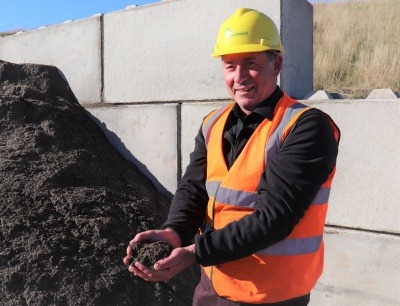Business in Brief – 07/10/21
Low carbon construction products achieve Scotland’s first end-of-waste status
 Recycling and waste management solutions business Levenseat has become the first Scottish company to secure ‘end-of-waste’ status for its new stream of low-carbon aggregates products. The Lanarkshire-based company was awarded the accreditation by the Scottish Environmental Protection Agency (SEPA).
Recycling and waste management solutions business Levenseat has become the first Scottish company to secure ‘end-of-waste’ status for its new stream of low-carbon aggregates products. The Lanarkshire-based company was awarded the accreditation by the Scottish Environmental Protection Agency (SEPA).
Developed by Levenseat’s Minerals Division, three of the newly certified products are produced from incinerator bottom ash (IBA) – 0-10 mm IBA aggregates; 0-25mm IBA aggregates; and IBA aggregate sand – while its recycled sand contains street sweepings and gully waste.
The certification will ensure that new IBA aggregate products manufactured by the company can be used as a safe replacement of 50 per cent virgin aggregate material in a bound application, while recycled sand has been approved for use in concrete, civil engineering work, and road construction.
Levenseat has also developed a range of sustainable building products, including lower carbon concrete ‘Lev-co blocks’, which are made from a mix of the company’s new aggregates and virgin materials. Compliant with international building and safety standards, the blocks can be used as a replacement for traditional interlocking concrete blocks, and are fully recyclable at end of life.
The company states that its low carbon product offering is designed to help construction firms lower their building costs, while also reducing their environmental impact by replacing virgin aggregate within concrete – for each tonne of recycled aggregate used, 29kg CO2 is prevented from being emitted. In 2020, 2.7 million tonnes of IBA was produced from Energy from Waste plants in the UK. By processing into recycled aggregates and directly replacing virgin mined aggregate used in concrete, Levenseat maintains, a carbon saving of 78,300 tonnes of CO2 can be achieved.
Radisson Hotel Group partners with Too Good To Go to tackle food waste
Radisson Hotel Group has announced a partnership with Too Good To Go across Europe in an effort to reduce food waste.
Too Good To Go is an application that allows businesses to redistribute the surplus food left at the end of a working day. It connects companies to customers, who purchase the food at a set, reduced cost.
The ultimate goal of the partnership is to locally redistribute the surplus food of Radisson Hotel Group hotels in Austria, Belgium, Denmark, Germany, Norway, United Kingdom, Italy, France, the Netherlands, Poland, Portugal, Spain, Sweden and Switzerland. Since the app’s activation, Radisson has saved 15,367 meals from going to waste, corresponding to a carbon dioxide emission reduction of 37.6 tonnes, the company states.
The use of the app accompanies the hotel company’s other recent food waste reduction measures, including portion control and improved food storage.
Mette Lykke, Chief Executive Officer of Too Good To Go says: “The latest figures on global food waste from the WWF have discovered the problem to be even higher than previously believed, with 40 per cent of all food going to waste.
“We need to address this urgently to avoid going backwards on the progress we’ve made in recent years. It is through partnerships like this that businesses can make an impact at scale, which we absolutely have a responsibility to do, on the complicated issue of food waste.”
Chanel announces new biobased bottle caps
Chanel has announced that all of the 125 ml bottles in its LES EAUX DE CHANEL line will be topped with caps made from plant-based materials.
The caps were developed in partnership with Sulapac and are composed of three layers, made out of 91 per cent biobased materials obtained, in part, from Forest Stewardship Council (FSC) certified wood chips.
Chanel also states that the line’s glass perfume bottles will be thinner and lighter compared to the brand’s other bottles of the same size, claiming that a smaller volume of raw materials will be required in their production. The range of perfume will also be packaged in corrugated cardboard, without lamination or gloss coating, in order to be easier to recycle.
Suv Haimi, CEO and Co-founder of Sulapac, commented: “Chanel is definitely one of the forerunners in the luxury industry as they want to invest in the latest sustainable material and technology innovations. We have set a very high-quality standard for our sustainable material, with an ambition to replace conventional plastics.
“This first product launch of our collaboration with Chanel, the biobased LES EAUX DE CHANEL cap made with Sulapac material, is a remarkable milestone for us. It proves that Sulapac meets the highest quality standards.”






